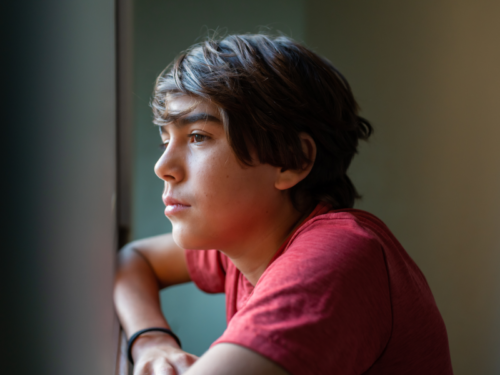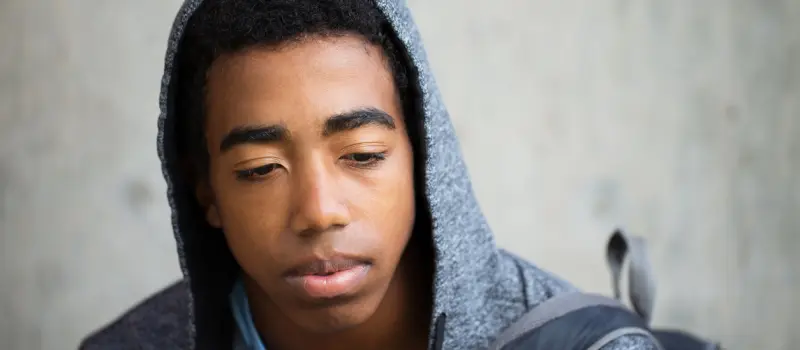
Table of Contents
What is Glass Child Syndrome?

Written By: Sarah duRivage-Jacobs

Clinically Reviewed By: Dr. Don Gasparini
Updated: September 15, 2025
9 min.
Everything you need to know about “glass child syndrome” and caring for the siblings of children with disabilities.
Learn more about our Clinical Review Process
Table of Contents
Despite what its name may suggest, “glass child syndrome” isn’t a medical condition or diagnosis. It’s a colloquial term often used to describe the challenges and unique strengths of the siblings of children with chronic illnesses or disabilities.
Alicia Maples, who herself is a sibling of special needs children, drew attention to the phenomenon in a 2010 TEDx talk. The term glass child, she said, comes from the idea that parents caring for children with special needs “look right through” their healthy siblings.
According to Maples, this comes at a cost: “Every emotion you feel because of your special-needs child, your healthy child feels all of it too, but with the coping skills of a child,” she says. Essentially, she suggests that children without chronic illnesses or disabilities also need support.
So what can parents and caretakers do to ensure glass children feel seen, valued, and cared for? We dive into this and more below.

We offer mental health support for your whole family
Individual therapy, group sessions, and family therapy designed for those with childhood trauma and more.
How many young people are glass children?
Understanding the prevalence of being a glass child is difficult, but according to one study, as many as 8% of young people in “advanced industrialized societies” grow up with a family member who is chronically ill.
Also, about 17% of children in the U.S. have one or more developmental disabilities, suggesting that a portion of young people likely have a sibling with a chronic illness or disability.
How might having a sibling with a chronic illness or disability impact a person?
Having a sibling with a chronic illness or disability can have a profound impact on a person’s life experiences, emotions, and relationships, both in the short and long term. Here are some impacts to keep in mind:
1. Perfectionism
In Maples’ case, being a glass child significantly impacted her family dynamics and took an emotional toll — in fact, as a child she hid her thoughts of ending her life from family members who were focused on her brother’s well-being. “Glass children are conditioned not to have any problems. We are supposed to be perfect. When someone asked us how we were doing, the answer was always: I’m doing fine,” she said.
2. People pleasing
Maples’ claim that the siblings of children with chronic illnesses or disabilities transform themselves to be what their families need them to be is supported by research. One study found that children living with a sibling with a chronic illness may communicate less and ignore their own needs.
Also, as their needs are deprioritized, they may find new ways to meet their needs themselves, like by learning new skills, the study found. All those transformations may be viewed as positive and as examples that the healthy sibling is doing well — even if they aren’t.
3. Hiding emotions
As Maples said, some siblings may not feel like they can share negative feelings or experiences because their parents are busy caring for the child with a chronic illness or physical or developmental disability.
They may feel that meeting their own needs comes second to the needs of their family. They may also distance themselves so they can better cope, which can intensify any negative effects.
4. Increased empathy
There may, however, also be positive impacts of being a glass child. The siblings of children with chronic illnesses or disabilities may develop more cognitive empathy — the ability to understand others’ emotions — than those without siblings who have chronic illnesses or disabilities.

How might having a sibling with a chronic illness or disability impact a person’s mental health?
As with any situation in life, not all people who have siblings with chronic illnesses or disabilities have the same experiences. That said, the mental health of so-called glass children is the subject of research — much of which shows that glass children suffer negative mental health effects from having a sibling with a chronic illness or disability.
A 2012 meta-analysis of 52 studies examining psychological functioning in the siblings of people with chronic illnesses or disabilities found that so-called glass children faced some negative mental health effects. The studies showed that siblings could be especially vulnerable to internalizing issues rather than seeking help from their parents. The results varied by age of the family member, with older siblings demonstrating more of a negative effect than younger siblings.
They also varied by how serious the illnesses were, with a heightened risk of psychological challenges among the siblings of children with highly intrusive and life-threatening illnesses.
Another study, published in 2013, broke down the psychological impact among 245 sibling participants. In the study, parents reported an increased rate of challenges in the following areas among their children who didn’t have chronic illnesses or disabilities:
- Interpersonal relationships: Glass children may struggle to connect with peers or feel emotionally isolated, especially when family attention is focused elsewhere.
- Overall functioning: Day-to-day coping and emotional regulation can become harder, especially when they’re expected to be “the strong one.”
- Functioning at school: Academic performance may decline due to emotional stress, distraction, or lack of parental support with homework.
- Use of leisure time: These children often sacrifice hobbies or play to care for their siblings or avoid being a burden themselves.
Most recently, a 2022 systematic review and meta-analysis found that siblings of children with chronic illnesses or disabilities were more likely to have symptoms of depression.
What are the signs that a glass child is having trouble coping?
The American Academy of Pediatrics writes that the following conditions or situations may be signs that the sibling of a child with a chronic illness or disability needs extra support:
1. Anxiety
They might constantly worry about their sick sibling, ask “What if something happens?” repeatedly, or have trouble sleeping at night.
2. Depression
You might notice them saying things like “It doesn’t matter,” “No one cares about me,” or spending most of their time alone in their room.
3. Withdrawing
Maybe they used to be chatty at dinner, but now barely speak, avoid family outings, or stay in their shell even around friends.
4. Anger
They may lash out over small things, yell, or slam doors — often because they feel invisible or overwhelmed.
5. Loss of interest in their friends or previously enjoyed activities
A child who used to love soccer or drawing might suddenly stop participating, saying, “I just don’t feel like it.”
Beyond childhood: The lasting impact of glass child syndrome
While many of the challenges faced by glass children show up in childhood or adolescence, the emotional effects often carry into adulthood — long after their sibling’s diagnosis has settled into the family’s routine.
Adults who grew up as glass children may struggle with setting boundaries, feeling guilty for prioritizing their own needs, or constantly trying to “fix” others.
Many take on the role of the caregiver in relationships, becoming overly responsible or emotionally suppressed, even when it’s not expected of them. Psychologists refer to this as parentification — when a child feels obligated to step into an adult role too early, often managing their own emotions while also trying to regulate the feelings of their parents or siblings.
Over time, this emotional burden can lead to anxiety, perfectionism, difficulty trusting others, or people-pleasing behaviors. The intensity of these long-term effects often depends on:
- The age gap between siblings
- Whether the illness was congenital or sudden
- Family communication style and emotional openness
- Cultural values around caregiving, strength, and silence
By acknowledging these long-term patterns, families and therapists can help glass children of all ages break free from invisible expectations — and begin healing with support and understanding.
How can you support glass children?
By offering understanding, support, and resources, you can help glass children navigate the challenges of growing up in a family impacted by chronic illness or disability while promoting their well-being and resilience. Here are some ideas and resources to support glass children:
- Supportive relationships with people in similar circumstances (the Sibling Leadership Network can be a great resource)
- Family involvement in care and support
- Open discussion with the healthcare providers of their siblings to reduce anxieties and uncertainties
- Age-appropriate educational materials about the illness
- Open family discussion about the illness and its impact
- Space to find personal interests, achieve goals, and develop a positive self-identity outside of illness and sibling support
- Going to a supportive camp
In her TEDx talk, Maples also recommended that parents or caregivers do the following to support glass children:
- Help your child find the care and support they need
- Show them that you love them unconditionally — not just because they’re able to help you care for the child with a chronic illness or disability
- Spend time with them alone
Mental health treatment for glass children
Mental healthcare and support are thought to be very helpful for the siblings of children with chronic illnesses or disabilities. The research exploring the best mental healthcare options for glass children is limited and inconclusive.
However, the important thing, says Maple, is to find some kind of support. “Find a safe place where they can go and talk about their feelings and get some tools, so they know how to cope,” she suggests.
One idea is to consider seeking professional help from therapists or counselors who specialize in supporting children and families dealing with chronic illness or disability. Cognitive behavioral therapy (CBT), family systems therapy, and group therapy with peers in similar roles can all be effective in helping glass children process emotions and develop boundaries.
Your child’s healthcare provider can help you find resources for support — and you can turn to mental healthcare programs like Charlie Health for individual therapy, supported groups, and family therapy personalized for your family and situation.
Frequently asked questions about glass child syndrome
Here are some frequently asked questions — and answers — about glass child syndrome:
Can glass children benefit from trauma-informed therapy?
Yes. While not always linked to trauma in the clinical sense, many glass children experience emotional neglect or stress that trauma-informed care can address with compassion and appropriate strategies.
How do I explain the concept of a glass child to my partner or co-parent?
Use relatable language: explain that while one child’s medical needs take priority, the healthy child may feel emotionally unseen, pressured to be perfect, or unable to express big feelings.
Are there support groups specifically for glass children?
Yes. Some programs, like the Sibling Support Project or online youth support groups, are tailored for siblings of children with special needs. Charlie Health also offers peer group therapy options.
How do I support both children without guilt or imbalance?
Start with open communication. Dedicate one-on-one time with each child, validate their feelings, and create family rituals that reinforce unity while recognizing individual needs.
Can glass children experience identity issues as they grow up?
Yes. Many struggle to define who they are outside of their siblings’ shadow, often tying their worth to achievement, helpfulness, or being “low maintenance.” Therapy can help them rebuild their identity on their own terms.

How Charlie Health can help
If someone in your life has grown up in the shadow of a sibling’s chronic illness or disability, the emotional weight they carry is real—and often invisible. Charlie Health is here to help. Charlie Health’s virtual Intensive Outpatient Program (IOP) provides more than once-weekly mental health treatment for young people and families dealing with serious mental health conditions. Our expert clinicians incorporate evidence-based therapies into individual counseling, family therapy, and group sessions. With this kind of holistic treatment, managing your mental health is possible. Fill out the form below or give us a call to start healing today.
References
https://tedxsanantonio.com/2010-speakers/alicia-arenas/
https://bmcpublichealth.biomedcentral.com/articles/10.1186/s12889-019-7834-6
https://www.cdc.gov/child-development/about/developmental-disability-basics.html
https://academic.oup.com/jpepsy/article/37/2/166/1746321#25702844
https://www.ncbi.nlm.nih.gov/pmc/articles/PMC4258644/#B43
https://www.jpeds.com/article/S0022-3476(22)00619-9/abstract#%20



